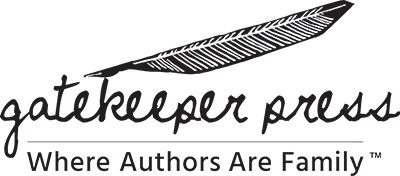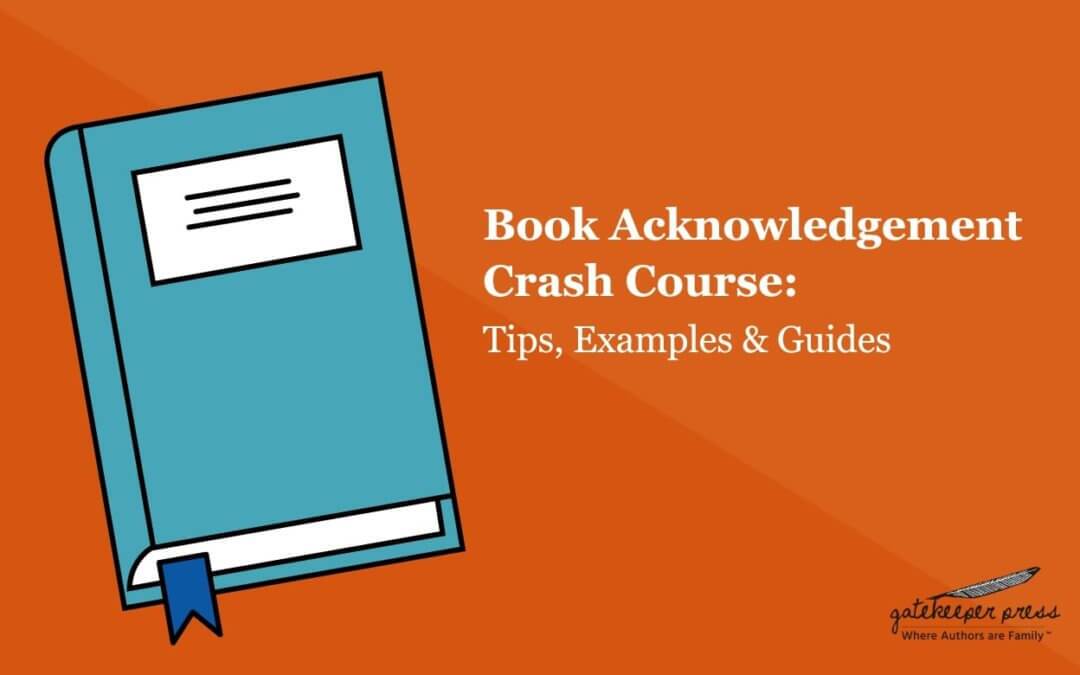A book acknowledgments page is the perfect setting for an author to express gratitude toward individuals who contributed meaningful support while writing the book. The acknowledgments page usually appears right before or after the table of contents or at the end of the book just before the author page. Indie authors can often play with the placement of this important page since they are in the driver’s seat when making design decisions.
An aspiring author may have some questions about how to write acknowledgments for a book. Some might even need clarification on the difference between a dedication and an acknowledgment. For the answers to these questions and more, you have come to the right place.
What is a Book Acknowledgement?
A book acknowledgment is the page or two that allows an author to publicly thank those who have provided some form of emotional, moral, financial, or academic support while undertaking the challenge of writing a book. Acknowledgements typically consist of a list of 5–10 people or organizations that have made specific contributions toward the author’s pursuit of completing their literary work.
Deciding who should be included in the acknowledgments can be a source of anxiety for some. An author may struggle when compiling a list of the people they wish to single out and acknowledge, fearing they may inadvertently exclude someone. Generally, the list should include those who played the most significant roles in supporting your writing efforts.
Book acknowledgments were not very common a few decades ago. Peruse your collection of classics and note that an acknowledgment rarely appears in the table of contents. Some authors used the last appendix to include people who had offered assistance, but most classic novels were devoid of a book acknowledgment page.
Book dedications, however, are a perennial staple in a book’s front matter. A dedication differs from the acknowledgments, as dedications are usually very targeted, personal, and brief, often only a single line or two. Book acknowledgments provide the space to go into some detail in thanking people who were sources of inspiration and support.
Tips for Writing a Book Acknowledgement
Book acknowledgments are read more often than people may think. Readers enjoy seeing who inspired the author and learning a bit about each person who played a role.
When wondering how to write acknowledgments for a book, there are some tried and true tips to consider:
1. Make a list. Begin the process by creating a list of all the people who helped bring your self-published book to fruition, and list them in order of their importance in that role. These individuals might include:
- Family members, such as parents, a spouse, children, or grandparents
- Friends
- Editor, book cover designer, or other production-related support
- Contributors to the content, collaborators
- Contributors of financial support, such as research grants
- Academic support or research assistants
- Mentors
- Organizations
2. Use your voice. The acknowledgments page offers the author an opportunity to go “off script” and reveal a bit of their personality or sense of humor. The best book acknowledgments take full advantage of this luxury, helping forge a deeper bond with the reader. People like to get a little glimpse of what’s under the hood, and the book’s acknowledgments page provides those insights. So, use a more conversational tone, and don’t be shy about revealing a quirky side or comedic bent while penning your acknowledgments. In fact, funny book acknowledgments are often the most memorable.
3. Offer specifics. When recognizing someone who offered special support along the way, be sure to tell the reader a bit about what that support looked like. These are the details that make an acknowledgments page worth reading. For example, “I want to thank my brother for his support” offers no information as to how that brother helped the author. Instead, something along the lines of, “And to my brother, Joseph, I am forever grateful for the hours you devoted, over many weekends, gathering family records. Those efforts helped bring this memoir to life.”
4. Be sincere. The book acknowledgments page provides significant emotional value to those who are mentioned. These people will treasure your book, as well as their memories of participating in the process as a source of support. When recognizing them, be honest and sincere when noting their contributions, but try to avoid overdoing it to the point that it begins to sound insincere. Expressing gratitude is a skill. You want to be genuine in your appreciation but avoid coming off as too syrupy sweet.
5. Don’t make it too long. It may be tempting to wax poetic about every human being that provided a modicum of support while writing the book. You want to give them their due praise and the acknowledgments page seems to be the perfect place. As with most writing projects, however, brevity is always preferable to verbosity. Try to keep a lid on this important page by sticking to a page or two in length.
Examples of Book Acknowledgments
It is interesting to read the wide variety of book acknowledgements out there, as authors seem to have diverse approaches to writing them. Much of what shapes the tone and content of an author’s acknowledgments is determined by the genre. For example, someone writing a romance novel will likely have a totally different tone than someone writing a nonfiction book on business leadership.
Read through these examples of book acknowledgments to gain some insights about how you might want to approach writing your own.
Ann Lamott, Bird by Bird. Ms. Lamott penned a brief but comprehensive book acknowledgments page that includes a sweet and personal touch at the end.
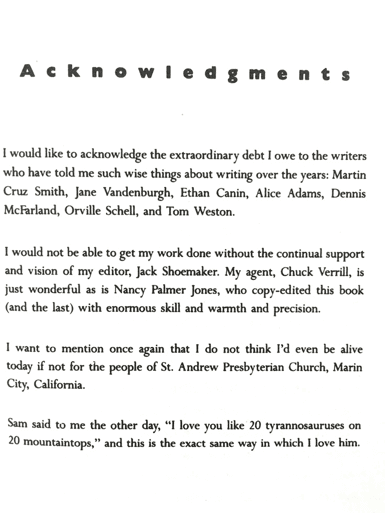
Tom Peters and Robert Waterman, Jr., In Search of Excellence. The authors wrote a lengthy 3.5 pages of acknowledgments that were very detailed and intellectual in tone. Here is page one:
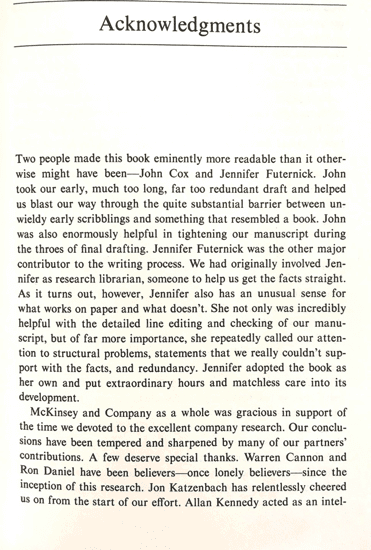
Geetanjali Gangoli, Indian Feminisms: Law, Patriarchies and Violence in India. The author wrote a heartfelt and concise acknowledgments page.
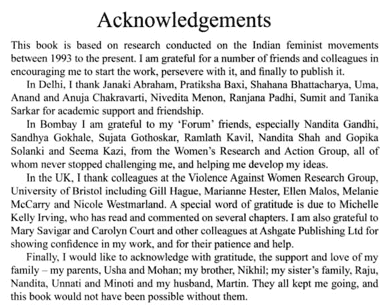
Ernest Hemingway, The Sun Also Rises (The Hemingway Library Edition). While the author did not include an acknowledgments page in his original work, his grandson, in spearheading this project to release a new edition, did.
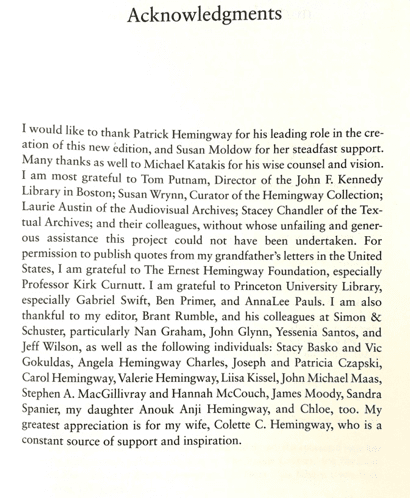
Robert H. Bork, Slouching Toward Gomorrah. The conservative scholar, and unsuccessful candidate for Supreme Court justice, wrote a two-page acknowledgment that ends with a little twist: “The views expressed in this book are my own and are not necessarily shared by any of the people or organizations that I have thanked.” Here is page one:
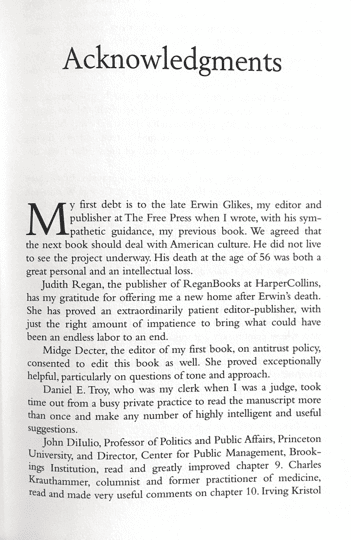
Refine Your Manuscript: Work with a Professional Editor
If you are a self-published author working feverishly on completing a manuscript par excellence, why not team up with the expert editing professionals at Gatekeeper Press? Our guidance can contribute to your book’s ultimate success and lead to a flawless acknowledgments page. Get started today!
